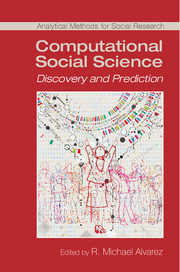Preface
Published online by Cambridge University Press: 05 March 2016
Summary
A few years ago, explaining what you did for a living to Dad, Aunt Rose, or your friend from high school was pretty complicated. Answering that you develop statistical estimators, work on numerical optimization, or, even better, are working on a great new Markov chain Monte Carlo implementation of a Bayesian model with heteroskedastic errors for automated text analysis is pretty much the definition of conversation stopper.
Then the media noticed the revolution that we're all a part of, and they glued a label to it. Now “Big Data” is what you and I do. As trivial as this change sounds, we should be grateful for it, as the name seems to resonate with the public and so it helps convey the importance of our field to others better than we had managed to do ourselves. Yet, now that we have everyone's attention, we need to start clarifying for others – and ourselves – what the revolution means. This is much of what this book is about.
Throughout, we need to remember that for the most part, Big Data is not about the data. Data is often easy to obtain and cheap, and more so every day. The analytics that turn piles of numbers into actionable insights are complex and become more sophisticated every day. The advances in making data cheap have been extremely valuable but mostly automatic results of other events in society; in contrast, the advances in the statistical algorithms to process the data have been spectacular and hard fought. Keeping the two straight is crucial for understanding the Big Data revolution and for continuing the progress we can make as a result of it.
Let us start with the data, the big data, and nothing but the data. For one, the massive increase in data production we see all across the economy is mostly a free byproduct of other developments underway for other purposes. If the HR team in your company or university installed new software this year, they will likely discover a little spigot that spews out data that, it will turn out, can be used for other purposes. Same for your payroll, IT infrastructure, heating and cooling, transportation, logistics, and most other systems. Even if you put no effort into increasing the data your institution produces, you will likely have a lot more a year from now than you do today.
- Type
- Chapter
- Information
- Computational Social ScienceDiscovery and Prediction, pp. vii - xPublisher: Cambridge University PressPrint publication year: 2016
- 9
- Cited by

